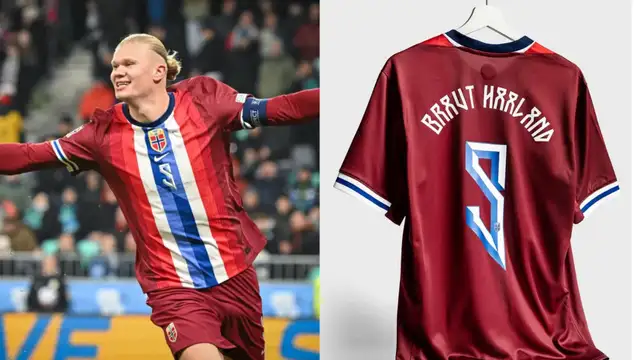
Erling Haaland, the towering Manchester City striker and global football phenomenon, has always been a figure who commands attention, whether for his goal-scoring heroics or his distinctive personal choices. As he prepares to lead Norway in a friendly against Finland on September 4, 2025, and a crucial World Cup qualifier against Moldova on September 9, fans have noticed a striking change on his national team jersey: the name “Braut Haaland” now adorns the back, replacing the simpler “Haaland” seen in his club career. This subtle yet meaningful shift has sparked curiosity among supporters worldwide, prompting questions about whether it’s a nickname, a tribute, or a nod to Norwegian culture. The answer lies in Haaland’s deep-rooted family heritage and a national tradition that celebrates both maternal and paternal lineage, revealing a personal side to the superstar who continues to redefine football.
Haaland’s full name, Erling Braut Haaland, reflects a Norwegian custom where surnames often serve as markers of family and regional identity. The “Braut” in his name comes from his mother, Gry Marita Braut, a former heptathlon champion whose athletic prowess has clearly influenced her son’s extraordinary physicality. His father, Alf-Inge Haaland, a former Premier League midfielder with stints at Leeds United and Manchester City, contributes the “Haaland” surname. In Norway, it’s common for individuals to honor both parents’ surnames, a practice that underscores family pride and cultural identity. By choosing to display “Braut Haaland” on his Norway jersey, a decision announced in late August 2025, Haaland is embracing this tradition, paying homage to his roots in Bryne, the small Norwegian town where his football journey began. “The inclusion of Braut is a personal nod to his upbringing in Bryne, the town where his football journey began,” one observer noted, emphasizing that this change is not about branding or marketing but about celebrating his heritage.
This isn’t the first time Haaland has used his full name in an international context. During the 2019 FIFA U-20 World Cup, where he made headlines by scoring a record-breaking nine goals in a single match against Honduras, he was registered as Erling Braut Haaland. Among Norwegian fans, he’s affectionately known as “Brauten,” or “The Braut,” a nickname that reflects the pride his compatriots take in his maternal lineage. “In Norway, we call him ‘Brauten,’” a supporter shared on social media, capturing the cultural significance of the name. Yet, at the club level—whether with Red Bull Salzburg, Borussia Dortmund, or Manchester City—Haaland has consistently used just “Haaland” on his jersey, a choice driven by the global marketability of a shorter name. For Norway, however, heritage takes precedence, and his decision to adopt “Braut Haaland” for international matches underscores a commitment to his roots over commercial appeal.
Haaland’s family story adds depth to this choice. Born in Leeds, England, in 2000 while his father played for Leeds United, Haaland moved to Bryne at age three, where he grew up immersed in football. His father, Alf-Inge, a gritty midfielder known for his time at Manchester City and a notorious clash with Roy Keane, has been a guiding force, advising Erling through major career moves, including his £51.2 million transfer to City in 2022. His mother, Gry Marita, brought her own athletic legacy, competing in heptathlon events like hurdles, high jump, and javelin during the 1990s. “Much of Erling’s remarkable athletic pedigree comes from his mother, Gry Marita Braut, a former Norwegian heptathlon champion,” one commentator noted, highlighting how her influence shaped Haaland’s speed and power. This blend of parental legacies has fueled Haaland’s rise to becoming Norway’s all-time leading scorer, with 42 goals in 43 appearances, and a global star whose 126 goals in 148 matches for Manchester City have redefined the striker role.
The jersey change also reflects Haaland’s personal evolution as he balances his Norwegian identity with his global fame. On Instagram, where he boasts millions of followers, he’s long gone by Erling Braut Haaland, a nod to his full identity that contrasts with the streamlined branding of his club career. “Haaland adding ‘Braut’ to his Norway shirt honours his heritage; a personal touch showing pride while reinforcing his unique football identity,” a fan remarked online, capturing the sentiment among supporters. The decision comes at a pivotal moment for Norway, who are top of their 2026 World Cup qualifying group with a perfect record after four matches. Alongside stars like Arsenal’s Martin Ødegaard and Manchester City’s Oscar Bobb, Haaland is under pressure to end Norway’s 28-year World Cup drought, a challenge he embraces despite tempered expectations. “Norway will never win the World Cup,” he told TIME magazine over the summer. “If we would qualify for the World Cup, it would be like another big nation winning it.”
As Haaland steps onto the pitch in Oslo, wearing “Braut Haaland” across his back, he carries more than just the hopes of a nation. The name is a testament to his family’s legacy, his small-town roots, and a cultural pride that resonates deeply in Norway. It’s a reminder that even a global superstar, capable of scoring braces against Wolves or breaking Premier League records with 88 goals in his first 100 matches, remains tethered to his origins. Whether he’s terrorizing defenses or honoring his mother’s maiden name, Erling Haaland continues to captivate, proving that his story is as much about heart and heritage as it is about goals.
Leave a Reply